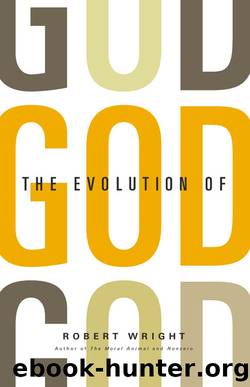The evolution of god by Robert Wright

Author:Robert Wright [Robert Wright]
Language: eng
Format: epub
Tags: Religion
ISBN: 9780316053273
Published: 2009-06-08T10:00:00+00:00
Was Jesus Really Necessary?
The mass appeal of Marcionite Christianity suggests that if the faith we now know as ChristianityâPauline Christianity â had fallen by the wayside in the second or third century, another version of Christianity probably would have prevailed. Specifically: a version featuring the doctrine of interethnic amity, the doctrine that realized the network externalities offered by the open platform of the Roman Empire. But what if there had been no Jesusâthen there couldnât have been any versions of Christianity to sponsor that doctrine, right? Well, there might not have been anything called Christianity. But even if Jesus had never been born, or had died in obscurity, some other vehicle for the meme of transethnic amity might well have surfaced.
There were plenty of vehicles around. Ever hear of Apollonius of Tyana? Like Jesus, he lived in the first century CE. According to stories later told by his devotees, he traveled with his disciples from town to town doing miracles: curing the lame and the blind, casting out demons. These powers emanated from his special access to the divineâhe was the son of God, some said âas did his gift of prophecy. He preached that people should worry less about material comforts and more about the fates of their souls, and he espoused an ethic of sharing. He was persecuted by the Romans, and upon death he ascended to heaven. This imparted a nice symmetry to his life, since his birth had been miraculous in the first place; before he was born, his divinity had been proclaimed to his mother by a heavenly figure. 14
Sound familiar?
But, you might protest, Apollonius of Tyana didnât posit a doctrine of interethnic love! Well, as weâve seen, Jesus probably didnât, either. The doctrine was developed by Paul, a religious entrepreneur who used it as the cement in his far-flung enterprise.
And what if Paul had never been born? Well, then Paul wouldnât have been the Bill Gates of his day, the person who saw an open platform and launched an enterprise that dominated it. But someone probably would have. When a big new platform emerges âwhether via the invention of the microcomputer or the founding of the Roman Empireâsomebody usually figures out a way to exploit it.
Or, to put the point in more technical language: when the emergence of a new platform creates potential positive network externalities, someone will probably find a way to realize them at the expense of the competition. Some microcomputer operating system would have flourished big-time once microcomputers became affordable, regardless of whether Bill Gates had been born.
The parallels between Apollonius and Jesus may be no coincidence. By the time stories about Apollonius were collected in a book, the Christian gospels had appeared, and his followersâwhether by conscious or unconscious embellishmentâmay have steered his profile toward Jesusâs. But thatâs the point: convergence of this sort was natural. Ancient religious proselytizers were working in a competitive environment. They were trying to get peopleâs attention and hold it, tell a story that could occupy a special place in their spiritual lives.
Download
This site does not store any files on its server. We only index and link to content provided by other sites. Please contact the content providers to delete copyright contents if any and email us, we'll remove relevant links or contents immediately.
| Buddhism | Christianity |
| Ethnic & Tribal | General |
| Hinduism | Islam |
| Judaism | New Age, Mythology & Occult |
| Religion, Politics & State |
Cecilia; Or, Memoirs of an Heiress — Volume 1 by Fanny Burney(32536)
Cecilia; Or, Memoirs of an Heiress — Volume 2 by Fanny Burney(31934)
Cecilia; Or, Memoirs of an Heiress — Volume 3 by Fanny Burney(31925)
The Secret History by Donna Tartt(19023)
Sapiens: A Brief History of Humankind by Yuval Noah Harari(14358)
Leonardo da Vinci by Walter Isaacson(13304)
The Radium Girls by Kate Moore(12012)
Sapiens by Yuval Noah Harari(5361)
How Democracies Die by Steven Levitsky & Daniel Ziblatt(5209)
The Wind in My Hair by Masih Alinejad(5085)
Homo Deus: A Brief History of Tomorrow by Yuval Noah Harari(4896)
Endurance: Shackleton's Incredible Voyage by Alfred Lansing(4749)
Man's Search for Meaning by Viktor Frankl(4567)
The Silk Roads by Peter Frankopan(4522)
Millionaire: The Philanderer, Gambler, and Duelist Who Invented Modern Finance by Janet Gleeson(4457)
The Rape of Nanking by Iris Chang(4194)
Joan of Arc by Mary Gordon(4091)
The Motorcycle Diaries by Ernesto Che Guevara(4081)
Stalin by Stephen Kotkin(3951)
